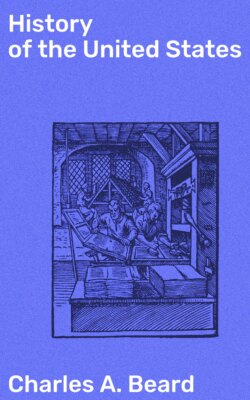Читать книгу History of the United States - Charles A. Beard - Страница 46
На сайте Литреса книга снята с продажи.
Resumption of British Revenue and Commercial Policies
ОглавлениеTable of Contents
The Townshend Acts (1767).—The triumph of the colonists was brief. Though Pitt, the friend of America, was once more prime minister, and seated in the House of Lords as the Earl of Chatham, his severe illness gave to Townshend and the Tory party practical control over Parliament. Unconvinced by the experience with the Stamp Act, Townshend brought forward and pushed through both Houses of Parliament three measures, which to this day are associated with his name. First among his restrictive laws was that of June 29, 1767, which placed the enforcement of the collection of duties and customs on colonial imports and exports in the hands of British commissioners appointed by the king, resident in the colonies, paid from the British treasury, and independent of all control by the colonists. The second measure of the same date imposed a tax on lead, glass, paint, tea, and a few other articles imported into the colonies, the revenue derived from the duties to be applied toward the payment of the salaries and other expenses of royal colonial officials. A third measure was the Tea Act of July 2, 1767, aimed at the tea trade which the Americans carried on illegally with foreigners. This law abolished the duty which the East India Company had to pay in England on tea exported to America, for it was thought that English tea merchants might thus find it possible to undersell American tea smugglers.
Writs of Assistance Legalized by Parliament.—Had Parliament been content with laying duties, just as a manifestation of power and right, and neglected their collection, perhaps little would have been heard of the Townshend Acts. It provided, however, for the strict, even the harsh, enforcement of the law. It ordered customs officers to remain at their posts and put an end to smuggling. In the revenue act of June 29, 1767, it expressly authorized the superior courts of the colonies to issue "writs of assistance," empowering customs officers to enter "any house, warehouse, shop, cellar, or other place in the British colonies or plantations in America to search for and seize" prohibited or smuggled goods.
The writ of assistance, which was a general search warrant issued to revenue officers, was an ancient device hateful to a people who cherished the spirit of personal independence and who had made actual gains in the practice of civil liberty. To allow a "minion of the law" to enter a man's house and search his papers and premises, was too much for the emotions of people who had fled to America in a quest for self-government and free homes, who had braved such hardships to establish them, and who wanted to trade without official interference.
The writ of assistance had been used in Massachusetts in 1755 to prevent illicit trade with Canada and had aroused a violent hostility at that time. In 1761 it was again the subject of a bitter controversy which arose in connection with the application of a customs officer to a Massachusetts court for writs of assistance "as usual." This application was vainly opposed by James Otis in a speech of five hours' duration—a speech of such fire and eloquence that it sent every man who heard it away "ready to take up arms against writs of assistance." Otis denounced the practice as an exercise of arbitrary power which had cost one king his head and another his throne, a tyrant's device which placed the liberty of every man in jeopardy, enabling any petty officer to work possible malice on any innocent citizen on the merest suspicion, and to spread terror and desolation through the land. "What a scene," he exclaimed, "does this open! Every man, prompted by revenge, ill-humor, or wantonness to inspect the inside of his neighbor's house, may get a writ of assistance. Others will ask it from self-defense; one arbitrary exertion will provoke another until society is involved in tumult and blood." He did more than attack the writ itself. He said that Parliament could not establish it because it was against the British constitution. This was an assertion resting on slender foundation, but it was quickly echoed by the people. Then and there James Otis sounded the call to America to resist the exercise of arbitrary power by royal officers. "Then and there," wrote John Adams, "the child Independence was born." Such was the hated writ that Townshend proposed to put into the hands of customs officers in his grim determination to enforce the law.
The New York Assembly Suspended.—In the very month that Townshend's Acts were signed by the king, Parliament took a still more drastic step. The assembly of New York, protesting against the "ruinous and insupportable" expense involved, had failed to make provision for the care of British troops in accordance with the terms of the Quartering Act. Parliament therefore suspended the assembly until it promised to obey the law. It was not until a third election was held that compliance with the Quartering Act was wrung from the reluctant province. In the meantime, all the colonies had learned on how frail a foundation their representative bodies rested.
